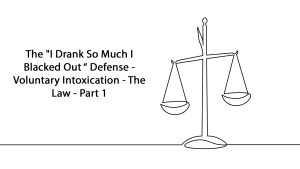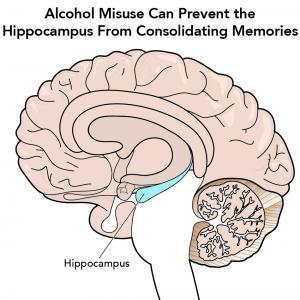The “I Drank So Much I Blacked Out “ Defense – Voluntary Intoxication – The Law
 By H. Michael Steinberg Colorado Criminal Defense Lawyer
By H. Michael Steinberg Colorado Criminal Defense Lawyer
Introduction – Blacking Out From Alcohol, Drugs Or Both
“Qui peccat ebrius, luat sobrius.”
“He who offends while drunk suffers punishment when sober.”
Colorado criminal law, Section 18-1-804(1), C.R.S., embodies and codifies this very old rule regarding self induced or so called “voluntary intoxication.” In essence the general rule is this “[i]ntoxication of the accused is not a defense to a criminal charge.”
But the law in this area is much more complex than that simple statement.
Colorado law defines self-induced intoxication as:
“Self-induced intoxication”
...means intoxication caused by substances which the defendant knows or ought to know have the tendency to cause intoxication and which he knowingly introduced or allowed to be introduced into his body, unless they were introduced pursuant to medical advice or under circumstances that would afford a defense to a charge of crime.
Here is Colorado’s current law on intoxication as a defense (as of 2023): CO Rev Stat § 18-1-804
Article 1. Section 18-1-804. Intoxication.
(1) Intoxication of the accused is not a defense to a criminal charge, except as provided in subsection (3) of this section, but in any prosecution for an offense, evidence of intoxication of the defendant may be offered by the defendant when it is relevant to negative the existence of a specific intent if such intent is an element of the crime charged.
(2) Intoxication does not, in itself, constitute mental disease or defect within the meaning of section 18-1-802.
(3) A person is not criminally responsible for his conduct if, by reason of intoxication that is not self-induced at the time he acts, he lacks capacity to conform his conduct to the requirements of the law.
(4) “Intoxication”, as used in this section means a disturbance of mental or physical capacities resulting from the introduction of any substance into the body.
(5) “Self-induced intoxication” means intoxication caused by substances which the defendant knows or ought to know have the tendency to cause intoxication and which he knowingly introduced or allowed to be introduced into his body, unless they were introduced pursuant to medical advice or under circumstances that would afford a defense to a charge of crime.
C.R.S. § 18-1-804
The Reasoning Behind The Law – “Moral Blameworthiness”
Those who are charged with general intent “non-premeditated” crimes, are not permitted to introduce voluntary intoxication as a defense because the law recognizes that “voluntary impairment of one’s mental faculties with knowledge that the resulting condition is a source of potential danger to others” involves “moral blameworthiness.”
The reasoning is this – it is common knowledge as to the results of consuming too much alcohol or drugs.
“[I]t is a matter of common knowledge that the excessive use of liquor or drugs impairs the perceptual, judgmental and volitional faculties of the user.”
Hendershott v. People, 653 P.2d 385 (Colo. 1982),
In 1982, the Colorado Supreme Court said this about self-induced intoxication.”
Self-induced intoxication involves moral culpability. Self-induced intoxication, by its very nature, involves a degree of moral culpability. The moral blameworthiness lies in the voluntary impairment of ones mental faculties with knowledge that the resulting condition is a source of potential danger to others.
Hendershott v. People, 653 P.2d 385 (Colo. 1982),
Sidebar: Compare “Involuntary Intoxication”
Voluntary intoxication is obvious – however involuntary intoxication usually arises when a person is duped into consuming a substance or when they are physically forced to ingest legal or illegal drugs and/or alcohol.
Involuntary intoxication IS a defense to a crime committed when a person was either unaware of the intoxicant or was forced into taking the substance. The defense of involuntary intoxication is addressed in a separate article by the author.
The Mistaken Common Belief That “Blacking Out” During The Commission Of A Crime Is A Defense
It is widely, but mistakenly, believed that if a person accused of committing a crime has no memory of their actions because they “blacked out” – they are not criminally liable for their actions. This is almost never the case.
“Blacking out” from consuming alcohol and then suffering from amnesia following their crimes is not a defense to committing a crime – with the exception of crimes that require the mental state of specific intent – such as premeditated murder (See section below)
Essentially blacking out causes a kind of “disassociated state.” “Dissociation,” in this context, is defined as a disruption of the normally integrated functions of consciousness, memory, identity, and motor behavior, that does not necessarily cloud one’s consciousness.
During a blackout, the person is awake and conscious, may be engaged in any type of activity or conversation, and may appear to the observer to be perfectly oriented.
Memory loss caused by an alcoholic blackout is can be extensive and not always irreversible. Sometimes the event can be recalled later, either spontaneously or a connection by another person triggers the memory.
Again, contrary to common belief, a blackout is not the same as “passing out.” Passing out means either falling asleep or losing consciousness from drinking too much. A person undergoing a “blackout” a is still awake but their brain is not creating new memories. On the other hand, depending on how much a person drinks, it is possible to “transition” from having a blackout to passing out.
 The “interrupted memories” from alcohol-induced blackouts can lead to an impaired memory of events that transpired while alcohol related blackouts are actual gaps in a person’s memory for events that occurred while they were intoxicated.
The “interrupted memories” from alcohol-induced blackouts can lead to an impaired memory of events that transpired while alcohol related blackouts are actual gaps in a person’s memory for events that occurred while they were intoxicated.
These gaps happen when a person drinks enough alcohol to temporarily block the transfer of memories from short-term to long-term storage—known as memory consolidation—in a brain area called the hippocampus.
Two Types of Blackouts
The two types of blackouts are further defined by the severity of the respective memory impairment.
A “fragmentary blackout” – is characterized by spotty memories for events, with “islands” of memories separated by missing periods of time in between sometimes referred to as a “grayout” or a “brownout.”
An “en bloc” blackout – Complete amnesia, often spanning hours, is known as an “en bloc” blackout. With this severe form of blackout, memories of events do not form and typically cannot be recovered. It is as if the events simply never occurred.
Blackouts And Blood Alcohol Levels (BAC)
Blackouts tend to begin at high concentrations of blood alcohol – for example at the BAC of 0.16 percent (twice the Colorado DUI egal driving limit) … and higher. At these high BACs, cognitive abilities such as impulse control, attention, judgment, and decision-making are significantly impaired.
Blackouts can also occur at much lower BACs in cases where a person ingests alcohol and and also takes sleep and anti-anxiety medications. Blackouts are also more likely to occur when alcohol enters the bloodstream quickly which can cause a person’s BAC to rise rapidly. An example of this is when someone drinks on an empty stomach or consumes large amounts of alcohol in a very short amount of time.
Memory Loss vs. The Required “Mental State” To Commit A Crime
Alcohol based amnesia following the consumption of a large amount of alcohol, is not the same as not having the mental state necessary to commit a crime. If an accused does not remember committing a crime it does not necessarily follow that he or she did not actually commit it.
Amnesia, in this context, is forgetting that a person has committed a crime, is not criminal defense.
While it is commonly believed that the defense of “I blacked out” or “I don’t remember what happened,” where the accused may actually not recall their actions taken while under the influence of alcohol and suffer memory loss, is not the same as the inability to form the relevant mental state required to commit a crime.
Put differently, the inability to recall certain facts of the commission of a crime does not necessarily mean the defendant didn’t intend to and actually commit that crime. As noted, this area of law is complex.
Let’s review some basic criminal law about mental states and Colorado crimes.
The Exception To The General Rule Of Voluntary Intoxication As A Defense To A Criminal Charge – General Intent Crimes Versus Specific Intent Crimes
Colorado criminal law DOES allow evidence of self induced intoxication in crimes that require specific intent.
Subsection 1 of Colorado Statute above – 18-1-804 provides a legal distinction between specific intent and general intent crimes
The elements of a crime require proof of both a mens rea and an actus reus. The mens rea is the mental element required for the commission of a specific crime. Under Colorado law, a crime is committed when the accused has committed a voluntary act (actus reus) prohibited by law accompanied by a culpable mental state (mens rea) The culpable mental state has the same level of importance as the element of the crime as the act itself and BOTH elements must be proven beyond a reasonable doubt.
Also, under Colorado law for a person to be convicted of a general intent crime, the prosecutor must prove that the defendant had a particular mental state such as committing a crime “knowingly” at the time the crime is committed.
The same is true for the other major category of crimes – specific intent crimes.
Here is what distinguishes the two types of crimes:
General intent crimes include crimes where the intent is to commit an act is without the intent to achieve a specific result. Most offenses require only that the prosecutor prove only that the defendant had the “general intent” to do what h or she did. The State must prove that the defendant knew that he or she did something the law prohibits, but not that he or she intended the consequences that followed.
Specific intent crimes include crimes where the intent is to commit an act and achieve a specific result. Specific intent crimes are clearly more difficult for the State to prove than general intent crimes. To commit a specific intent crime, there must exist the planning necessary to commit an intentional unlawful act, to achieve a specific result. The crime is committed with a specific purpose and to achieve a particular outcome.
For general intent crimes – one’s level of self-induced intoxication is clearly NOT a defense to the crime charged – BUT intoxication may be relevant and admissible at trial to a determination of whether the defendant formed, or had the capacity to form, the requisite specific intent for the commission of a specific intent crime.
What People May Mistakenly Believe …
Those accused of Colorado crimes often mistakenly believe, as a result of self induced intoxication, that they should not be held legally responsible for their actions because if they do not recall their actions at the time of the crime.
Summary and Conclusion – The “I Drank So Much I Blacked Out “ Defense – Voluntary Intoxication – The Law
Ultimately, and to summarize,it is important to understand that voluntary intoxication is not a defense to most crimes. Drinking too much cannot used it as a defense if one commits a crime when they are too drunk to understand, control, or even recall, their actions – such as the decision to drink and drive (DUI) or to commit and act of domestic violence such as misdemeanor Assault.
On the other hand, voluntary intoxication MAY BE a defense for certain specific intent crimes such as First Degree (premeditated First Degree Murder, Second Degree Burglary, and all Thefts and the crimes of Forgery.
Colorado Criminal Law – The “I Drank So Much I Blacked Out “ Defense – Voluntary Intoxication – The Law
The reader is alerted to the fact that Colorado criminal law, like criminal law in every state and at the Federal level, changes constantly. The article appearing above was accurate at the time it was drafted but it cannot account for changes occurring after it was uploaded.
 ABOUT THE AUTHOR: H. Michael Steinberg – Email The Author at: hmsteinberg@hotmail.com
ABOUT THE AUTHOR: H. Michael Steinberg – Email The Author at: hmsteinberg@hotmail.com
A Denver Colorado Criminal Defense Lawyer – or call his office at 303-627-7777 during business hours – or call his cell if you cannot wait and need his immediate assistance – please call 720-220-2277.
“A good criminal defense lawyer is someone who devotes themselves to their client’s case from beginning to end, always realizing that this case is the most important thing in that client’s life.”
Putting more than 40 years of Colorado criminal defense experience to work for you.
You should be careful to make a responsible choice in selecting a Colorado Criminal Defense Lawyer. We encourage you to “vet” our firm. Over the last 40 years – by focusing ONLY on Colorado criminal law – H. Michael has had the necessary time to commit to the task of constantly updating himself on nearly every area of criminal law, to include Colorado criminal law and procedure and trial and courtroom practice.
H. Michael works hard to get his clients the best possible results in and out of the courtroom. He has written, and continues to write, extensively on Colorado criminal law and he hopes this article helps you in some small way.
 Colorado Criminal Lawyer Blog
Colorado Criminal Lawyer Blog

